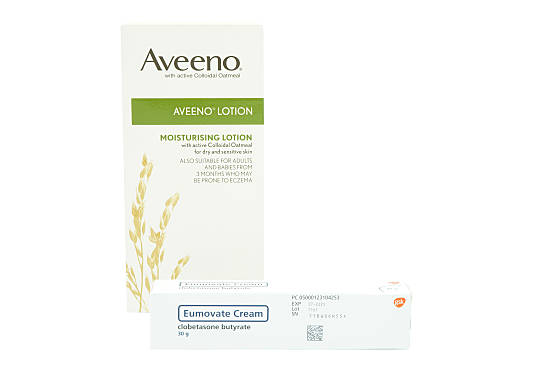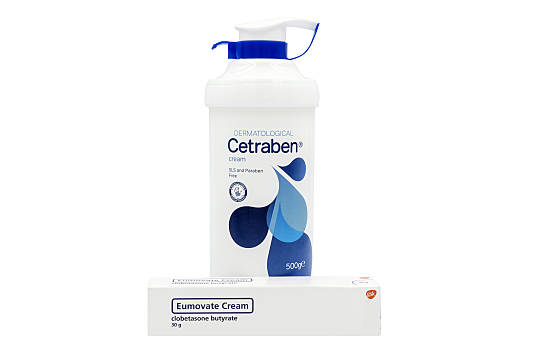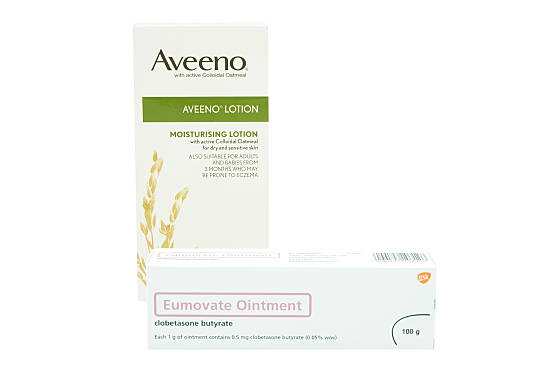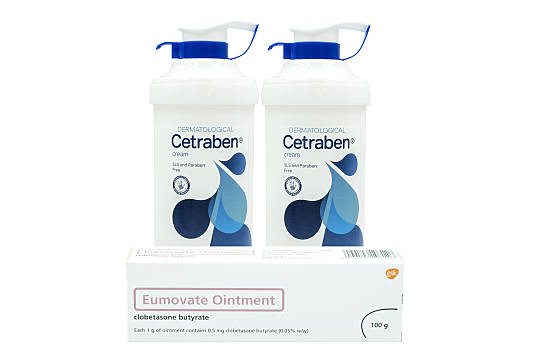Eczema Treatment
Get eczema treatment delivered to your home with free and fast delivery.
Prices from £29.99
Simply fill in a brief consultation questionnaire and one of our doctors will review your request today.
Eczema is a very common skin condition that can cause dry skin, irritation, swelling, and itching. The 2 main types of eczema are atopic and contact eczema. Symptoms can be relieved with the use of emollients and topical corticosteroids that are applied to the affected areas of the skin.
ZAVA stocks emollients such as Aveeno and Cetraben. These can be prescribed in a bundle with corticosteroid creams, like hydrocortisone and Eumovate.
Our quick and easy online doctor service provides a convenient way of getting your eczema medication. You need to fill in a brief questionnaire, so our doctor can approve appropriate treatment. Once your prescription has been approved we will dispatch your medication via post.

In stock. Prices from £29.99

In stock. Prices from £44.95

In stock. Prices from £29.99

In stock. Prices from £44.95

In stock. Prices from £29.99

In stock. Prices from £29.99

In stock. Prices from £29.99

In stock. Prices from £29.99

No results found.
Please check your spelling or try another treatment name.



About eczema treatment
-
-
Eczema is a non-contagious, common skin condition that affects adults and children. The 2 main types of eczema are atopic and contact eczema. These can cause swollen, itchy, and irritated skin. People with eczema often have flare ups which cause their eczema symptoms to worsen. Emollients and corticosteroids can be used to treat eczema.
-
-
Atopic eczema is the most common form of eczema and can cause dry, itchy, and cracked skin. Atopic eczema is usually a long term condition and is more common in children. It can improve or get better with the use of eczema treatments. Atopic eczema can affect any part of your body and can cause flare ups.
-
-
Contact eczema, which is also called contact dermatitis, is eczema that is triggered by a substance, such as an allergen or irritant. Contact eczema usually goes away or improves once the substance that is causing your symptoms is identified.
Once you know what causes your contact eczema you should avoid it, if you can. Contact eczema causes your skin to become dry, cracked, itchy, and blistered. These symptoms appear a few hours or days after you have come into contact with the allergen or irritant.
-
-
Atopic eczema does not have a main cause, but it may be triggered by certain things, such as allergies. It can also be genetic, which means it runs in your family. Some symptoms may have triggers, like foods, stress, washing detergents, and weather.
Contact eczema is caused by a substance that has irritated your skin. This could be an irritant, like washing detergent or soap, or an allergen, such as dust or pollen.
-
-
Atopic eczema can cause your skin to look flaky and dry. It may affect small areas of your skin or be widespread over your whole body. The affected areas of your skin can become red if you have lighter skin, or grey, purple, or darker brown if you have darker skin. It often affects the inside of your elbows, hands, backs of your knees, and scalp.
Contact eczema can cause blistered, dry, itchy, and cracked skin. On lighter skin, the affected areas become red and on darker skin, they become purple, grey, or dark brown. Contact eczema can happen on any part of your body but is common on the face and hands. Your skin might look red and swollen, or like you have a rash.
Both types of eczema may produce a clear fluid. This is known as weeping. Eczema looks different for every person, so it is best to speak to your doctor to diagnose eczema.
-
-
Eczema can be treated with emollients (special moisturisers) and topical corticosteroids. These are applied to affected areas of your skin and can help to relieve symptoms and treat flare ups.
The emollients available from ZAVA are Aveeno lotion and Cetraben cream. Emollients are to be used every day, even when you have no symptoms. They can be used as often as required, usually 3 to 4 times daily. They work by providing moisture to your skin, which can prevent flare-ups and irritation.
Topical corticosteroids are a prescription only treatment, as they contain steroids which are applied directly to your skin. We stock hydrocortisone cream and ointment, which contains hydrocortisone, and Eumovate cream and ointment, which contains clobetasone butyrate. Both can reduce swelling, itching, and redness during a flare up. They should be used sparingly, 1 to 2 times a day. As they should only be used for flare ups, they are prescribed for a maximum of 1 week.
Some people may need stronger corticosteroid treatments to control their eczema. Your GP may suggest a stronger treatment.
The best treatment option for your eczema may be different from someone else’s. If you have eczema, you must speak to your doctor, as they can help you find the best treatment for you.
-
-
Eczema treatment can cause some side effects, so speak to your doctor if they bother you too
much, or do not go away once your body gets used to the treatment. If any treatment makes your eczema very sore or inflamed, rinse your skin and speak to your doctor straight away.
The side effects for emollients include:
- swelling or redness
- oozing (leaking)
- burning or stinging that does not go away after a few days of use
- blocked hair follicles, which can cause boils
Less common side effects include:
- bleeding
- fever
- allergic reaction
As emollients do not contain medication, there are less side effects. For more information on side effects, check the patient information leaflet included in the box.
The most common side effects of topical corticosteroids include:
- burning or stinging that does not go away after a few days
- blocked hair follicles, which can cause boils on your skin
Less common side effects include:
- worsening of your flare up
- acne
- stretch marks
- thinning of your skin
- changes to skin colour
- allergic reaction
- increased hair growth around the affected area of your skin
- rosacea, which is a skin condition that causes a red and flushed face
Rare side effects include:
- reduced growth (in children)
- Cushing’s syndrome, a rare hormone condition
Topical corticosteroids should only be used sparingly. Using more can increase the risk of side effects. For more information on topical corticosteroid side effects, check the patient information leaflet included with your tube.
-
-
There is no cure for atopic eczema, but treatment can help to relieve symptoms and improve flare ups. Contact eczema can clear up on its own, if you can avoid your triggers. Using emollient creams every day is the best way to clear up your eczema and reduce the amount of flare ups you get. If you do get a flare up, a topical corticosteroid should be used to prevent infection and stop your flare up. There are also other things you can do to help clear up your eczema, such as changing your diet and avoiding scratching the affected areas.

Dr Kathryn Basford is a qualified GP who works as a GP in London, as well as with ZAVA. She graduated from the University of Manchester and completed her GP training through Whipps Cross Hospital in London.
Meet our doctorsLast reviewed: 17 Dec 2021
-
Atopic eczema (2019) NHS (accessed 12 December 2021)
-
Contact dermatitis (2019) NHS (accessed 12 December 2021)
-
Eumovate Cream (2020) EMC (accessed 12 December 2021)
-
Hydrocortisone for skin (2020) NHS (accessed 12 December 2021)





